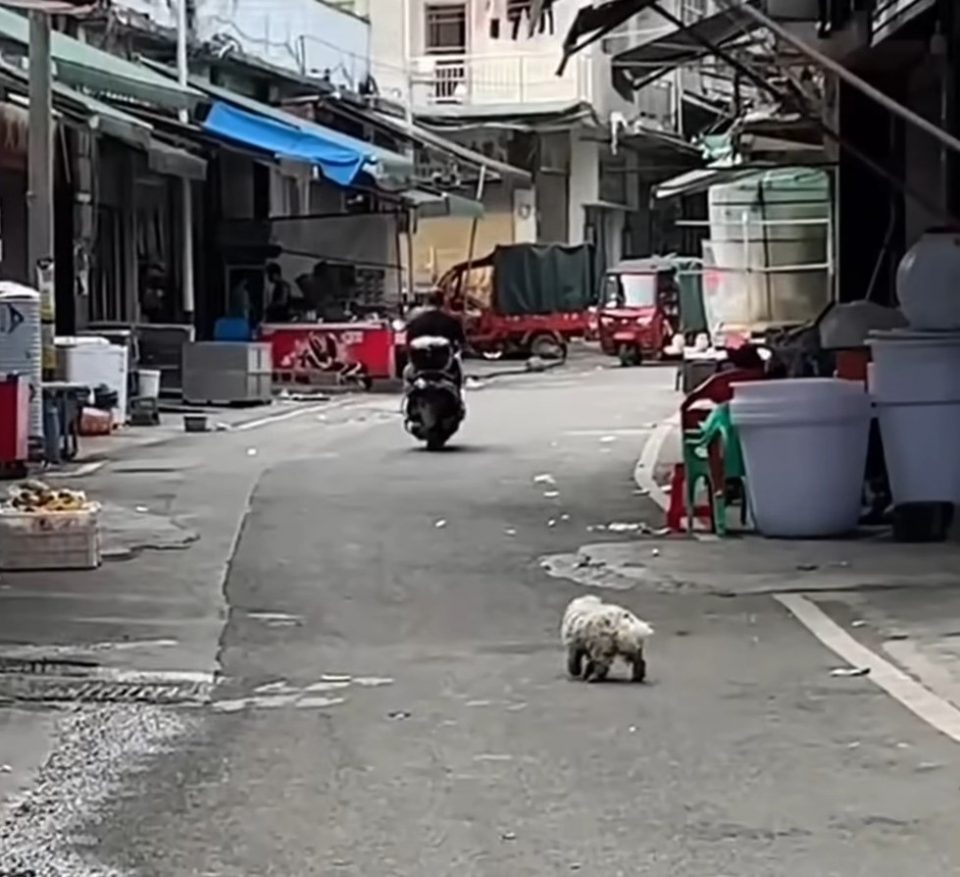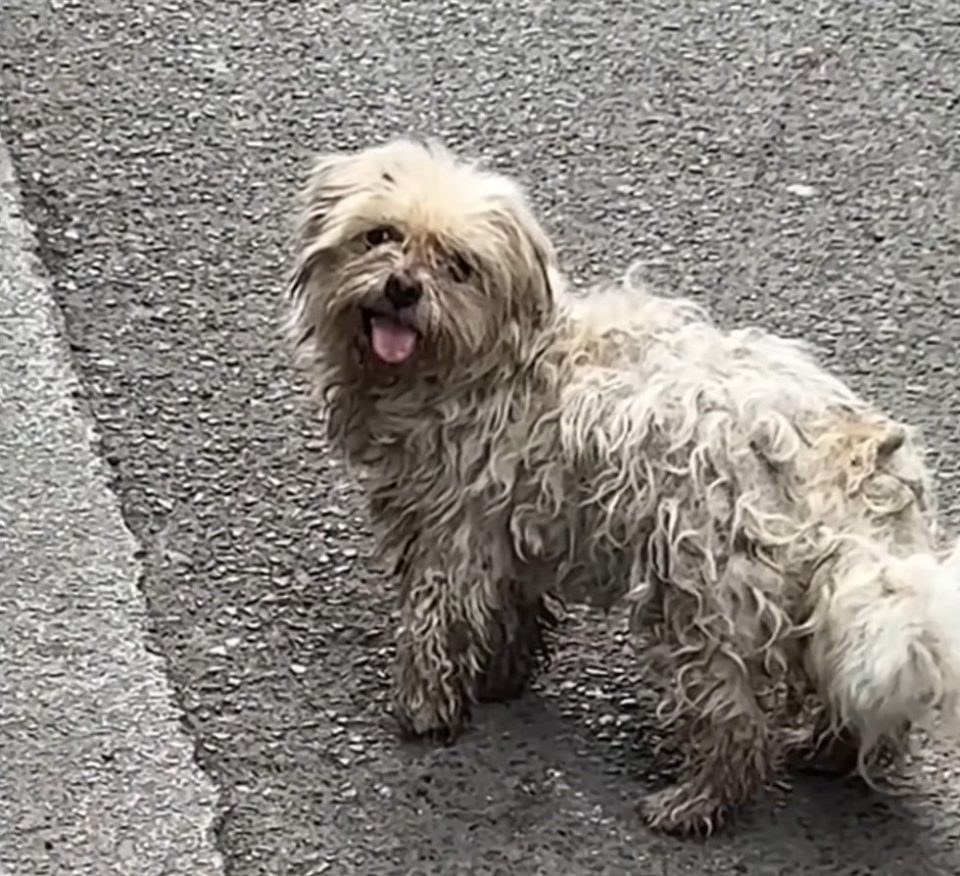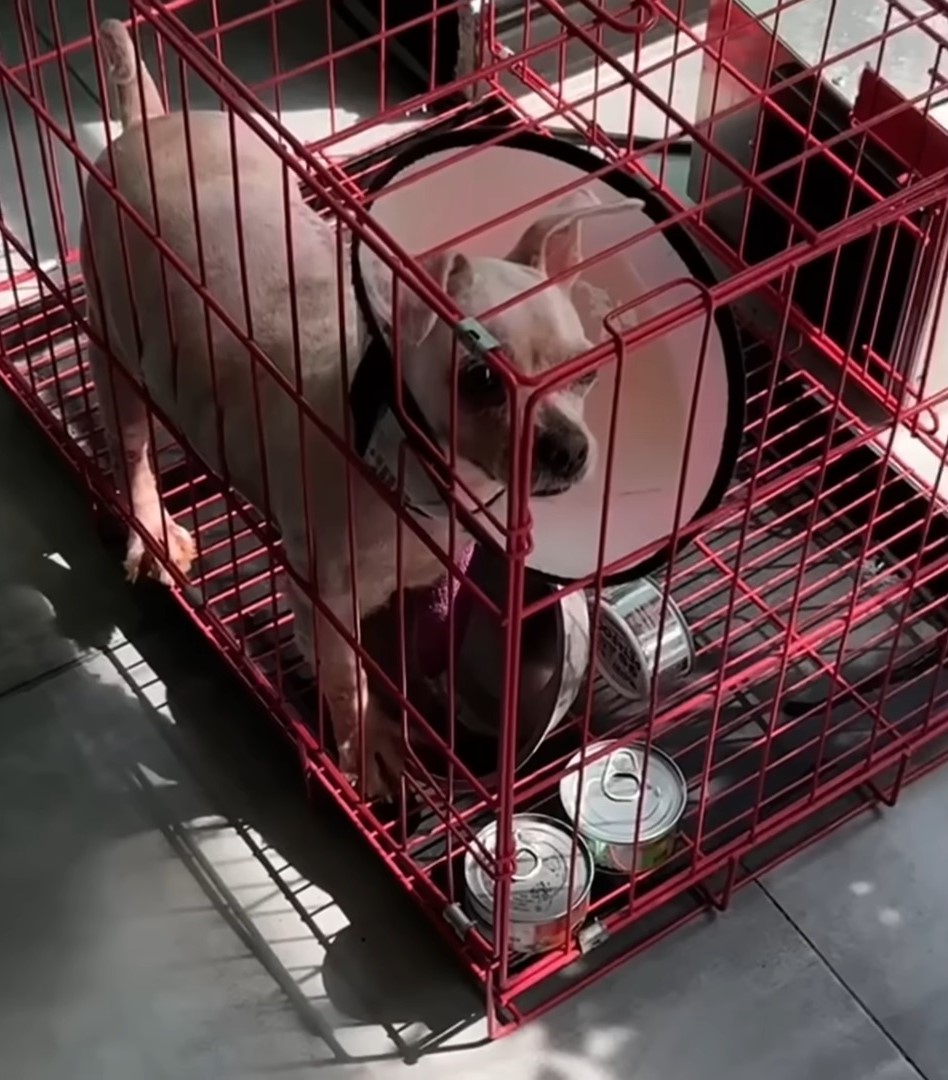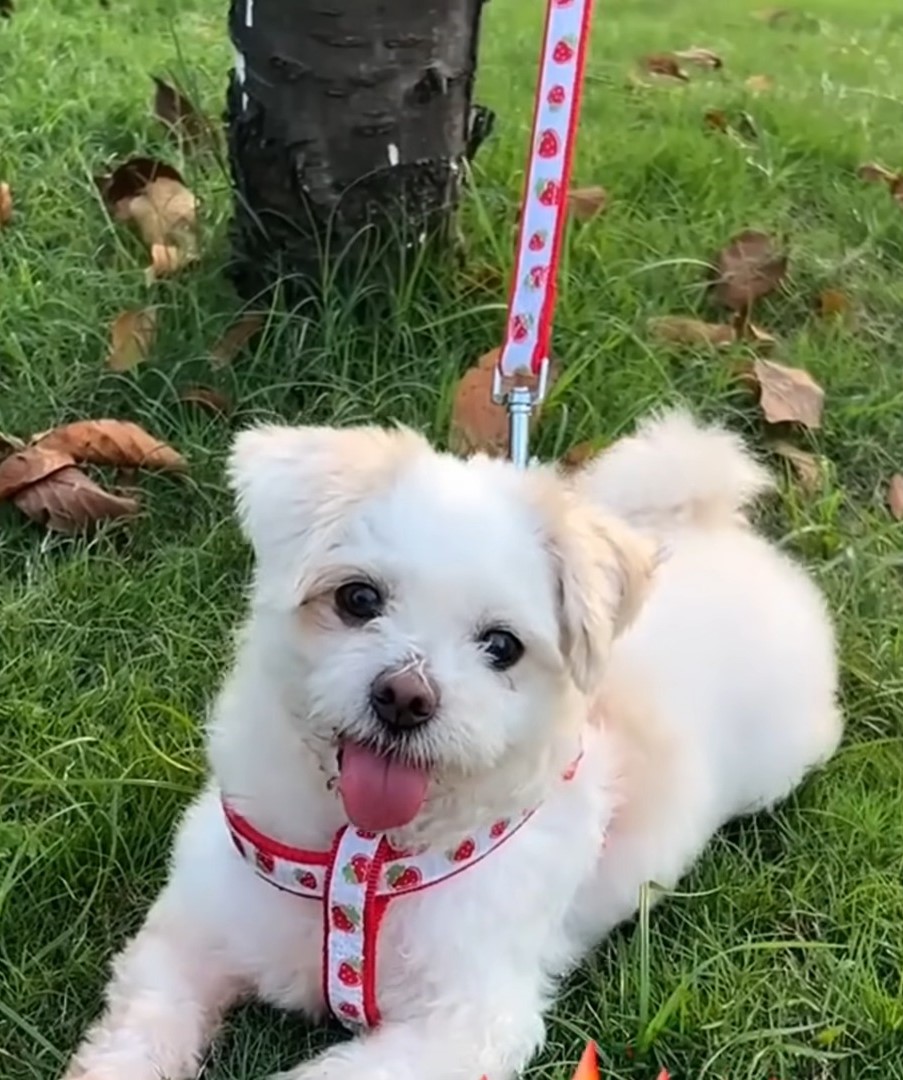It’s really awful witnessing a small and injured puppy struggle so much to survive when it should really be enjoying its life in a wonderful home.
This really puts things in perspective on how cruel the world can be sometimes and why it’s like that.
For the dog we will be talking about in this story, he was completely alone and had a really bad leg injury, which made it difficult for him to go out every day and get food.
All he wanted was some food and a warm shelter, but he was struggling until someone really kind noticed his misfortune and decided to help.
She Was A Hopeful Pup

When a group of kind people noticed a stray dog wandering near a market, they couldn’t help but feel sad for her.
She looked so sad and defeated. To make matters worse, she was limping to a nearby store to see if there was any leftover food.
They just couldn’t sit back and do nothing, so they immediately approached the sweet pup, gave her some water, and went to ask about her.
A nearby store owner said she doesn’t belong to anyone and that she pretty much just wanders around the area looking for food. She had an accident recently, which resulted in her leg injury.

She usually sleeps near a market stall, so she may have been a bit cold as well. They noticed just how friendly she was despite being in such a dire situation. She hadn’t given up on people.
Her amazing rescuers took her to a vet, who helped get rid of her matted fur. After that, she got a warm bath and they also helped treat her injured leg.
After about six days in their care, she was making positive change and was almost ready to be discharged from the clinic.
She Loves Her New Life

The vets had decided to do an X-ray for her to check if there were any problems in her healing process.
While it looked like her leg would heal up nicely, they noticed that there was something wrong with her legs. She had some sort of abnormality.
They told the rescuers that she would not walk like a normal dog even when she recovered. While this was a bit difficult to hear, they decided to help her in any way they could.
So, she was given treatment along with regular exercise, which would make it easier for her to walk in the future.
Her wonderful rescuers would take her to the park regularly and they even bought her some nice clothes. She really liked where her life was at the moment. Everything was going well.

A few weeks later, her leg healed considerably and a lot of the fur had grown back. She was a really beautiful dog. Her weight was also back to normal.
They are so happy to see that she is now able to run and have fun. Her rescuers love taking her wherever they go, and she enjoys it immensely.
After saving her from the awful street life, they realized that they loved this little dog and that she belongs with them, so the rescuers decided to adopt her.
Despite going through so many hardships in her life, everything has turned out so well for her, and she is now living her best life with two wonderful people.
If you’ve ever caught your furry friend munching on another dog’s poop, you’re not alone in wondering what’s behind this less-than-appetizing habit. Dogs eating poop, also known as coprophagia, can leave you puzzled and slightly grossed out. It’s a behavior that seems bizarre to us but is surprisingly common in the canine world. As a seasoned dog trainer, you’ve likely encountered this behavior more than once and understand the confusion it can cause among pet parents.
Watching your dog indulge in such behavior can be both perplexing and concerning. While it may not be the most pleasant topic of conversation, delving into the reasons behind why dogs eat poop can shed light on their behavior and help you navigate this peculiar aspect of canine life. As someone well-versed in the quirks of dog behavior, you know that there’s often more to these actions than meets the eye.
Understanding Coprophagia in Dogs
The Basics of Canine Coprophagia
If you’re wondering why dogs eat poop, it’s a behavior known as coprophagia. Dogs might engage in this behavior for various reasons, such as seeking nutrients, mimicking natural behaviors, or simply out of curiosity. Despite how unpleasant it may seem to us, it’s a relatively common behavior among dogs.
Health-Related Causes Behind the Behavior
Sometimes, coprophagia in dogs can be a sign of underlying health issues. Nutrient malabsorption, enzyme deficiencies, parasites, or even diseases like diabetes may drive a dog to eat feces. If your dog suddenly starts this behavior or does it excessively, it’s crucial to consult a vet to rule out any health concerns.
Psychological and Behavioral Factors
Stress and Anxiety as Triggers
If a dog is stressed or anxious, it might exhibit coprophagia as a coping mechanism. Dogs, like humans, can experience stress from various sources, including changes in their environment, loud noises, separation anxiety, or other pets in the household. When feeling overwhelmed, some dogs may resort to eating feces to alleviate their anxiety or seek comfort.
Learned Behavior from Other Dogs
Dogs are social animals that learn from observing and mimicking others, especially within their pack or household. If a dog sees another dog engaging in coprophagia, it might imitate this behavior out of curiosity or a desire to fit in. This learned behavior can be unintentionally reinforced if the dog receives attention or a reaction from its owner after consuming feces, leading to the repetition of this habit.
Nutritional Deficiencies and Diet
Lack of Nutrients in the Dog’s Diet
If your dog is eating another dog’s feces, it could be due to a lack of essential nutrients in their diet. Sometimes, dogs resort to coprophagia as a way to compensate for missing vitamins, minerals, or other nutrients in their food. Make sure your furry friend is getting a balanced diet to avoid this behavior.
The Role of Digestive Enzymes
In some cases, dogs may eat poop because they have issues with digesting their food properly. Digestive enzymes play a crucial role in breaking down food for absorption. If your dog’s digestive system is not functioning as it should, they might turn to feces as a source of enzymes. Consider discussing this with your vet to ensure your dog’s digestive health is in check.
How to Discourage Your Dog from Eating Poop
Training and Behavior Modification Techniques
To tackle your dog’s poop-eating habit, start with training and behavior modification. Teach the “leave it” and “drop it” commands to redirect their attention from feces. Use positive reinforcement with treats when they obey and consistently practice these commands during walks.
Diet Adjustments and Supplements
Consider adjusting your dog’s diet to discourage poop-eating. Ensure they are on a balanced and nutritious diet to prevent any nutritional deficiencies that might drive them to consume feces. Consult with your vet to determine if they need any additional supplements to address any missing nutrients.
When to Consult a Veterinarian
Recognizing Symptoms That Require Professional Help
If your dog’s poop-eating behavior is sudden, excessive, or accompanied by other concerning symptoms like vomiting, diarrhea, lethargy, or weight loss, it’s crucial to consult a veterinarian promptly. These symptoms could indicate underlying health issues that need medical attention. Remember, your vet is the best person to diagnose any potential problems and provide tailored guidance.
Treatment Options for Coprophagic Dogs
Treatment options for coprophagia in dogs vary depending on the underlying cause. Your vet may recommend strategies such as dietary changes, behavior modification techniques, or supplements. In some cases, addressing any nutrient deficiencies or gastrointestinal issues can help curb this behavior. It’s essential to follow your vet’s advice closely to find the most suitable treatment plan for your furry friend’s specific situation.
Conclusion
Understanding why dogs eat other dogs’ poop involves a mix of nutritional, behavioral, and health factors. It’s essential to monitor your dog’s behavior and consult a vet if you notice any sudden changes. Coprophagia can be a complex issue influenced by various triggers, from stress to dietary deficiencies. By addressing these underlying causes and seeking professional guidance when needed, you can help your furry friend overcome this behavior. Remember, each dog is unique, so tailor your approach based on your pet’s specific needs. With patience, a balanced diet, and the right support, you can work towards minimizing or eliminating coprophagia in your dog.
Frequently Asked Questions
What is coprophagia in dogs?
Coprophagia in dogs is the behavior of eating feces, which can be due to seeking nutrients, mimicking natural behaviors, or underlying health issues.
When should I consult a vet regarding coprophagia?
Consult a vet if your dog suddenly starts eating feces excessively, as it could indicate health issues.
Can stress trigger coprophagia in dogs?
Yes, stress can trigger coprophagia in dogs as a coping mechanism.
How can dogs learn coprophagia behavior?
Dogs can learn coprophagia behavior from observing others and unintentionally reinforcing it through attention.
What role do diet and nutrition play in coprophagia?
Diet and nutrition are significant factors in coprophagia. Ensure your dog has a balanced diet and address any digestive enzyme problems.
When should I seek professional help for my dog’s coprophagia?
Seek professional help if your dog shows symptoms like vomiting, diarrhea, lethargy, or weight loss along with coprophagia.
What are the treatment options for coprophagia in dogs?
Treatment options include dietary changes, behavior modification techniques, and supplements recommended by vets based on your dog’s specific situation.
[no_toc]

Hey there, I’m Janet Brooks, a dog-loving student from California. I’m all about helping pups in need, especially those without homes. Me and my awesome friends work together to give shelter and love to stray dogs. Oh, and I also write blogs about dogs to share helpful info.